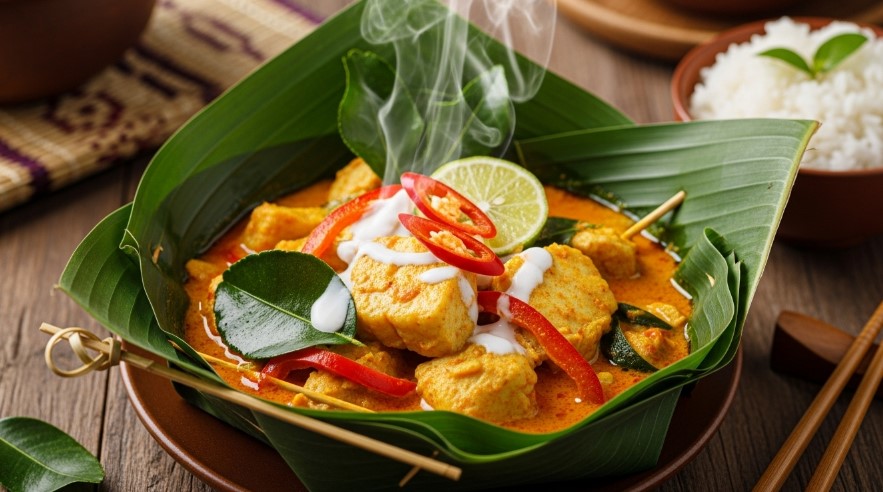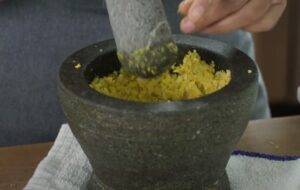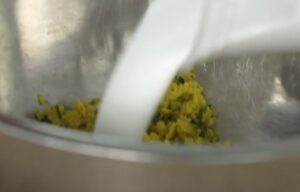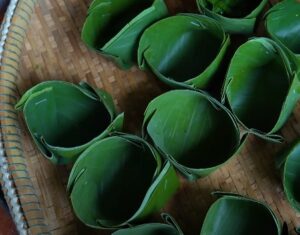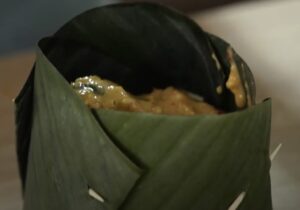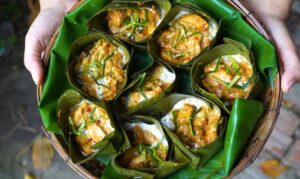When people ask about Cambodia’s national dish, the answer comes quickly and without hesitation: Amok Trey. This is a steamed fish curry prepared with coconut milk, aromatic spices, and served in banana leaves, making it both visually beautiful and deeply traditional. The concrete answer to why it is so important is that Amok Trey represents the balance of flavors that defines Khmer cooking—creamy yet light, fragrant yet not overwhelming, comforting yet elegant.
For Cambodians, Amok Trey is a dish reserved for celebrations and special occasions, but for travelers, it is the best way to taste the sophistication of Khmer cuisine in one spoonful. Eating Amok Trey connects you to centuries of food heritage, influenced by Cambodia’s rivers, farmlands, and ancient spice routes.
The first time I tried Amok Trey was in Phnom Penh, at a small riverside restaurant. The dish arrived in a banana leaf bowl, steamed just enough for the curry to set into a mousse-like texture. The fish was tender, the coconut milk rich but not heavy, and the herbs created a fragrance that stayed with me long after the meal. Later, when I visited Siem Reap, I tasted different variations—some spicier, others sweeter—but every version carried the same essence: comfort and tradition in one dish.
What Makes Amok Trey Unique
Amok Trey is not just another curry. Its preparation technique—steaming the curry mixture with fish until it sets—is what makes it stand out.
| Component | Details | Role in Flavor |
| Fish (Trey) | Freshwater fish such as catfish, snakehead, or tilapia | Soft, flaky protein that absorbs curry flavors |
| Coconut milk | Fresh or canned, rich and creamy | Creates the smooth, custard-like texture |
| Kroeung (spice paste) | Lemongrass, galangal, turmeric, kaffir lime leaves, garlic, shallots | The soul of Khmer cuisine, aromatic and complex |
| Eggs | Beaten into the curry mixture | Helps the curry set into a mousse-like texture |
| Banana leaves | Used as a bowl for steaming | Adds aroma and traditional presentation |
| Herbs | Kaffir lime leaves, holy basil | Freshness and fragrance |
The balance of creamy coconut milk, earthy spices, and light fish is what makes Amok Trey a dish unlike any other in Southeast Asia.
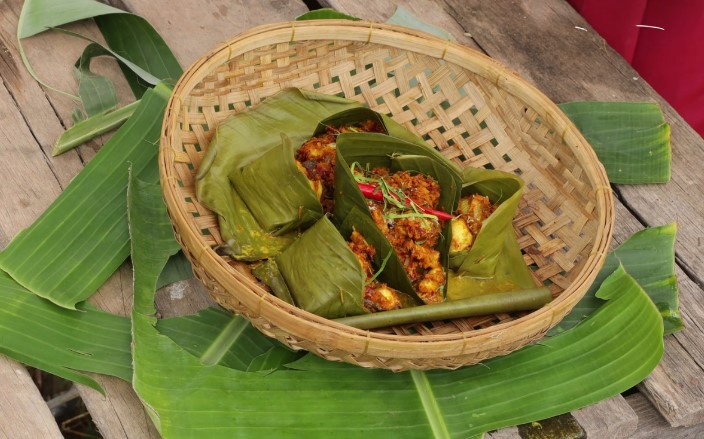
Amok Trey
Ingredients
Equipment
Method
- Make the Kroeung Paste: Using a mortar and pestle (or blender for convenience), pound together lemongrass, galangal, turmeric, garlic, shallots, kaffir lime leaves, and chili peppers until you get a fine, fragrant paste.
- Mix the Curry Base: In a large bowl, combine the freshly made kroeung paste with coconut milk, fish sauce, palm sugar, and beaten eggs. Whisk everything until smooth and well blended.
- Add the Fish: Gently fold the cubed fish into the curry mixture, ensuring all pieces are well-coated.
- Prepare Banana Leaf Bowls: Cut banana leaves into approximately 20x20 cm squares. Soften them over low heat (on a dry pan or over an open flame) to make them pliable. Fold into bowl shapes and secure with toothpicks at the corners. Alternatively, use ramekins.
- Steam the Curry: Spoon the fish and curry mixture evenly into each banana leaf bowl (or ramekin). Place them in a steamer over medium heat and steam for 20–25 minutes, or until the mixture sets to a soft custard consistency.
- Garnish and Serve: Top with a drizzle of coconut cream, shredded kaffir lime leaves, and fresh basil. Serve hot with steamed jasmine rice for an authentic Cambodian meal.
Video
Notes
Cooking Tips
- Softening Banana Leaves: Run banana leaves briefly over a flame or steam them to prevent tearing during folding.
- Fish Options: Mild white fish works best. Catfish is traditional, but tilapia or cod are great substitutes.
- Custard Texture: The mix should be soft but set. Avoid over-steaming to prevent the custard from becoming rubbery.
- No Banana Leaves? Use ramekins or small bowls and cover with foil while steaming to maintain moisture.
Regional and Modern Variations
Like many Cambodian dishes, Amok Trey changes slightly depending on where you try it.
| Region | Variation | Notes |
| Phnom Penh | Classic freshwater fish amok | Smooth, mild, most traditional |
| Siem Reap | Spicier, with more chili added | Popular with tourists who enjoy the heat |
| Coastal Cambodia | Sometimes made with crab or shrimp | Reflects the coastal harvests |
| Modern restaurants | Chicken or tofu versions | Adapted for international diners |
This means you can taste Amok Trey many times during a trip and still experience something new.
Why Every Visitor Should Try It
Amok Trey is not just food—it is a piece of Cambodia’s cultural identity. For locals, it is a dish of pride, often served at weddings, festivals, and family gatherings. For visitors, it is a way to understand the elegance of Khmer cuisine. It is richer and more refined than street breakfasts like Bai Sach Chrouk or Nom Banh Chok, yet it is equally accessible and welcoming.
At most local restaurants, a serving of Amok Trey costs between $3 and $5. For something so delicate and deeply traditional, it is one of the most valuable culinary experiences you can have in Cambodia.
Traveler’s Guide
| Detail | Recommendation |
| Where to try | Riverside restaurants in Phnom Penh, Siem Reap eateries, and coastal towns |
| Best time of day | Lunch or dinner—often too rich for breakfast |
| Average price | $3–5 in restaurants, higher in tourist spots |
| Eating etiquette | Enjoy with steamed rice; don’t skip the herbs on top |
| Tip | Look for versions served in banana leaves—the aroma adds authenticity |
Conclusion
Amok Trey is more than Cambodia’s national dish—it is the essence of Khmer cooking captured in a single meal. The combination of fish, coconut milk, and kroeung spice paste steamed gently in banana leaves tells the story of Cambodia’s rivers, fields, and traditions.
For visitors, tasting Amok Trey is like being welcomed into Cambodian culture. It is elegant yet humble, refined yet comforting. If you want to understand the depth of Khmer cuisine, don’t just try it once—try it in different regions, with different variations, and let each version tell you its story.
